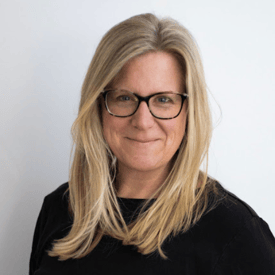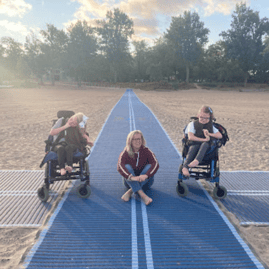Curious Minds Want to Grow
Today, we hear from Sara Pot, a brilliant, brave, and badass human who has leveraged her curious mind as she's navigated difficult conversations.
At least once a month in 2024, we will hear from humans who help us see learning, leadership, and liberation in new and everyday ways, holding the precious truths and focusing our eyes to see.

Heartfelt thanks to you, Sara, for sharing your wise reflections with us.
Fellow leaders and learners, I wish you courage, rest, and beloved community along the journey.


“What’s wrong with them?”
I turn and see a young child looking curiously at my girls. It’s a busy afternoon in the grocery store, and I am with my two teenage daughters, Rachel, 17, and Janneke, 15. Both girls are smiling, sitting quietly in their wheelchairs. Their feeding tubes can be seen hanging on the right side of their chairs.
The child's parent looks at me, blushes with embarrassment, and shushes their child, telling them to turn away. At that moment, I choose to step forward and catch the child’s attention with my own question: “Hi. What do you see that makes you think something is wrong?”
Difficult conversations. Do you avoid them or engage them? What does it look like when you are in a difficult conversation? Are you mentally scrambling to find the right words, submitting to an emotional response, or finding the nearest exit?
When I think about the young child’s question and the parent’s visible response, I wonder if unconscious bias could be a culprit in some of our difficult conversations or why we run from them.
Many of us capture photos, record videos, and curate images daily to build a narrative of our liking. There’s comfort in the familiar, and it’s reassuring when we are in control. In my experience, both personally and professionally, difficult conversations emerge when we encounter something unfamiliar, when something is out of our sphere of control, or when there is a power imbalance.

Though I won’t pretend to have the remedy for eliminating difficult conversations, I’ve leaned into these two practices:
Remain curious, ask questions in humility, and respect the response. Monica Guzmán, author of I Never Thought of It That Way, invites us to turn our assumptions into questions. This practice lends itself to unpacking the shortcuts we make in our minds (which can turn into biases) as we process interactions. Furthermore, Guzman counters that those who are underrepresented in our circles risk being overrepresented in our imagination, building a misinformed lens through which we see the world and manage our conversations.
Pay attention to what you observe - not just what you think or know. Recently, I completed some training with Visual Thinking Strategies, a method that improves critical thinking skills through facilitated discussions of artwork. I was inspired by Dr. Brian Goldman, who referenced the method in his book, The Power of Teamwork, about the science of team building in healthcare. Goldman’s storytelling illustrates how key questions specific to observation can help shift the power dynamic and invite more transparency and collaboration in situations that are often intense, such as the hospital's emergency department.
 There are days when I am tired for my girls of the stares. But my response matters when a young child asks with curiosity and innocence. What might seem difficult for my girls and me at the moment can be pivotal for the child, creating a lasting impression.
There are days when I am tired for my girls of the stares. But my response matters when a young child asks with curiosity and innocence. What might seem difficult for my girls and me at the moment can be pivotal for the child, creating a lasting impression.


What is Sara Reading, Watching, or Listening to?
- Remember: The Science of Memory and the Art of Forgetting by Lisa Genova

April 24, 2024




Comments